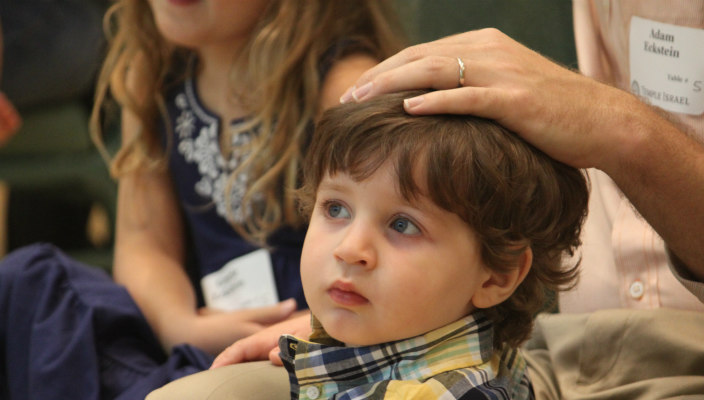
Tot Shabbat has always been part of our community at Temple Sinai Congregation of Toronto. Traditionally, we gathered once a month for an early dinner followed by a service in the sanctuary for kids of all ages. These gatherings were fun and formative for families with young children, but often ended with kids running laps in the sanctuary. Our members share fond memories of these evenings, in spite of a fair amount of chaos, but our clergy team strived for something better.
As clergy and educators, we recognized that none of us specializes in early childhood spiritual development, and yet, we were attempting to engage toddlers in a service. In an effort to close this gap, we invited Ellen Allard, a top-notch Jewish music educator, to join us in leading Tot Shabbat for a weekend. Although our time with her was great, we realized we could not replicate any element of what she brought to our community. So, we appointed Ellen as our early childhood educator-in-residence, adding five additional weekend visits spread throughout the year.
Ellen helped our leadership team engage in a transformative learning process over the course of the year. With her guidance, we reviewed various aspects of our Tot Shabbat program and transformed it into KIDushat Shabbat, a new model for prayerful experiences for young children and their families.
First, we studied children’s basic developmental benchmarks and considered how to incorporate them into prayer experiences. We shared a powerful “aha” moment when we learned about the important role of repetition in the lives of 4-year-old children. We always planned different music every month, believing it would keep things exciting and new. In fact, this isn’t what 4-year-olds need at all. They happily watch the same movie multiple times and ask for the same story each night before bed. Knowing what’s going to happen brings them comfort and a sense of mastery. Knowing this about our youngest congregants, we decided instead to reprise the same tunes each month, and have seen children’s enthusiasm grow.
Next, we reflected on our space. Although we have a beautiful sanctuary with stained-glass windows and fixed seating, it is not conducive to KIDushat Shabbat for several reasons. Children have a hard time seeing from the seats, clergy are way up high and separated from the community, and the only movement the space affords the children is to run in circles around the room. We now know we need to embrace their movement and be in a space that encourages it in a thoughtful way. Therefore, we created a prayer space in our social hall with bright-colored carpets and a portable ark. We set up chairs around the carpet to make the space feel cozy (and so grandparents can be comfortable), but it turns out that sitting on the floor can truly make our spirits soar!
We also revisited the goal of Tot Shabbat. In the past, we intended for children to gain synagogue skills so they would be comfortable praying as adults. We now aspire to engage the youngsters in prayer as the rambunctious, curious Jews they are today. For our pre-readers, we traded in our siddurim for puppets, toys, and games. For example, we now hide props around the room for children to find as we go on a virtual tour of Israel; we explore kindness and friendship using puppets; and we create a bridge that the children can climb over to cross the Red Sea.
Finally, we restructured the schedule of our program: In the past, dinner preceded services and when children were finished eating, they participated in a kid-friendly activity such as a magic show, a concert, or a puppet show so parents could eat in peace. These activities, however, were draining children’s limited attention span, leaving them unable to concentrate on services.
Our current structure includes:
- Craft activity/snack socializing (15 minutes)
- Creative prayer/holiday activity (20 minutes)
- Family-style Shabbat dinner (30 minutes)
- Interactive musical prayer service (20 minutes)
- Oneg Shabbat – with cookies! (15 minutes)
Using this model, our team has had four years of success with KIDushat Shabbat, none of which would have been possible if Ellen Allard hadn’t been willing to hold our hands and offer invaluable advice throughout our learning journey.
At the same time, we constantly strive to improve our program and we continually ask, “How can we do this better?” In recent days we have identified two new challenges: First, we need to consider the spiritual needs of parents and grandparents who attend KIDushat Shabbat. Engaged appropriately, they, too, can be full participants. Second, older siblings often attend KIDushat Shabbat and their religious development shouldn’t be ignored. Perhaps there is a leadership role they can play during the evening? And so, our journey continues.
We’re eager to refine our existing program and create new models through a similar process of change, carefully considering all participants’ needs and abilities and always ensuring that as children grow, develop, and ask important questions that will shape their Jewish identity, we will be there to hold their hands, answer their questions, and strengthen their connections to our tradition.
Have something to say about this post? Join the conversation in The Tent, the social network for congregational leaders of the Reform Movement. You can also tweet us or tell us how you feel on Facebook.
Rabbi Daniel Mikelberg and Cantor Katie Oringel serve Temple Sinai Congregation of Toronto. They were ordained by Hebrew Union College-Jewish Institute of Religion (HUC-JIR) in 2008 (Los Angeles) and 2009 (New York) respectively. Individually and together, they pride themselves on sharing Torah in creative ways with the young and the young-at-heart.
Related Posts

Setting Your Leaders Up For Success

Safety, Equity, and Accountability is the Path to a Thriving Jewish Community
